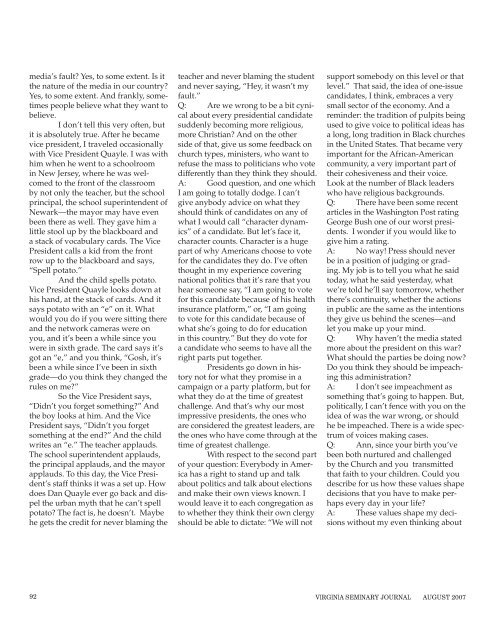Seminary Journal 2008 (August) - Virginia Theological Seminary
Seminary Journal 2008 (August) - Virginia Theological Seminary
Seminary Journal 2008 (August) - Virginia Theological Seminary
Create successful ePaper yourself
Turn your PDF publications into a flip-book with our unique Google optimized e-Paper software.
media’s fault? Yes, to some extent. Is it<br />
the nature of the media in our country?<br />
Yes, to some extent. And frankly, sometimes<br />
people believe what they want to<br />
believe.<br />
I don’t tell this very often, but<br />
it is absolutely true. After he became<br />
vice president, I traveled occasionally<br />
with Vice President Quayle. I was with<br />
him when he went to a schoolroom<br />
in New Jersey, where he was welcomed<br />
to the front of the classroom<br />
by not only the teacher, but the school<br />
principal, the school superintendent of<br />
Newark—the mayor may have even<br />
been there as well. They gave him a<br />
little stool up by the blackboard and<br />
a stack of vocabulary cards. The Vice<br />
President calls a kid from the front<br />
row up to the blackboard and says,<br />
“Spell potato.”<br />
And the child spells potato.<br />
Vice President Quayle looks down at<br />
his hand, at the stack of cards. And it<br />
says potato with an “e” on it. What<br />
would you do if you were sitting there<br />
and the network cameras were on<br />
you, and it’s been a while since you<br />
were in sixth grade. The card says it’s<br />
got an “e,” and you think, “Gosh, it’s<br />
been a while since I’ve been in sixth<br />
grade—do you think they changed the<br />
rules on me?”<br />
So the Vice President says,<br />
“Didn’t you forget something?” And<br />
the boy looks at him. And the Vice<br />
President says, “Didn’t you forget<br />
something at the end?” And the child<br />
writes an “e.” The teacher applauds.<br />
The school superintendent applauds,<br />
the principal applauds, and the mayor<br />
applauds. To this day, the Vice President’s<br />
staff thinks it was a set up. How<br />
does Dan Quayle ever go back and dispel<br />
the urban myth that he can’t spell<br />
potato? The fact is, he doesn’t. Maybe<br />
he gets the credit for never blaming the<br />
teacher and never blaming the student<br />
and never saying, “Hey, it wasn’t my<br />
fault.”<br />
Q: Are we wrong to be a bit cynical<br />
about every presidential candidate<br />
suddenly becoming more religious,<br />
more Christian? And on the other<br />
side of that, give us some feedback on<br />
church types, ministers, who want to<br />
refuse the mass to politicians who vote<br />
differently than they think they should.<br />
A: Good question, and one which<br />
I am going to totally dodge. I can’t<br />
give anybody advice on what they<br />
should think of candidates on any of<br />
what I would call “character dynamics”<br />
of a candidate. But let’s face it,<br />
character counts. Character is a huge<br />
part of why Americans choose to vote<br />
for the candidates they do. I’ve often<br />
thought in my experience covering<br />
national politics that it’s rare that you<br />
hear someone say, “I am going to vote<br />
for this candidate because of his health<br />
insurance platform,” or, “I am going<br />
to vote for this candidate because of<br />
what she’s going to do for education<br />
in this country.” But they do vote for<br />
a candidate who seems to have all the<br />
right parts put together.<br />
Presidents go down in history<br />
not for what they promise in a<br />
campaign or a party platform, but for<br />
what they do at the time of greatest<br />
challenge. And that’s why our most<br />
impressive presidents, the ones who<br />
are considered the greatest leaders, are<br />
the ones who have come through at the<br />
time of greatest challenge.<br />
With respect to the second part<br />
of your question: Everybody in America<br />
has a right to stand up and talk<br />
about politics and talk about elections<br />
and make their own views known. I<br />
would leave it to each congregation as<br />
to whether they think their own clergy<br />
should be able to dictate: “We will not<br />
support somebody on this level or that<br />
level.” That said, the idea of one-issue<br />
candidates, I think, embraces a very<br />
small sector of the economy. And a<br />
reminder: the tradition of pulpits being<br />
used to give voice to political ideas has<br />
a long, long tradition in Black churches<br />
in the United States. That became very<br />
important for the African-American<br />
community, a very important part of<br />
their cohesiveness and their voice.<br />
Look at the number of Black leaders<br />
who have religious backgrounds.<br />
Q: There have been some recent<br />
articles in the Washington Post rating<br />
George Bush one of our worst presidents.<br />
I wonder if you would like to<br />
give him a rating.<br />
A: No way! Press should never<br />
be in a position of judging or grading.<br />
My job is to tell you what he said<br />
today, what he said yesterday, what<br />
we’re told he’ll say tomorrow, whether<br />
there’s continuity, whether the actions<br />
in public are the same as the intentions<br />
they give us behind the scenes—and<br />
let you make up your mind.<br />
Q: Why haven’t the media stated<br />
more about the president on this war?<br />
What should the parties be doing now?<br />
Do you think they should be impeaching<br />
this administration?<br />
A: I don’t see impeachment as<br />
something that’s going to happen. But,<br />
politically, I can’t fence with you on the<br />
idea of was the war wrong, or should<br />
he be impeached. There is a wide spectrum<br />
of voices making cases.<br />
Q: Ann, since your birth you’ve<br />
been both nurtured and challenged<br />
by the Church and you transmitted<br />
that faith to your children. Could you<br />
describe for us how these values shape<br />
decisions that you have to make perhaps<br />
every day in your life?<br />
A: These values shape my decisions<br />
without my even thinking about<br />
92 VIRGINIA SEMINARY JOURNAL AUGUST 2007



